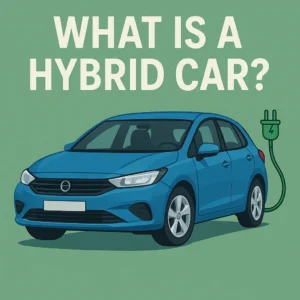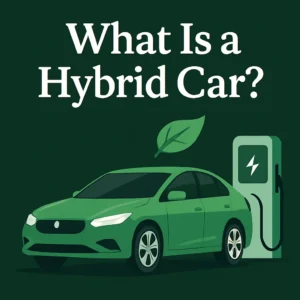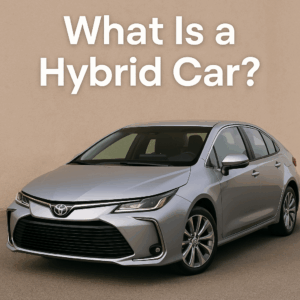What is a hybrid car? As the automotive industry shifts toward sustainability, hybrid vehicles have emerged as a popular middle ground between traditional gasoline engines and fully electric cars. They offer the best of both worlds—efficiency, reduced emissions, and extended driving range. Whether you’re considering buying a hybrid or just curious about how they work, this article breaks down the key concepts, types, and benefits of hybrid cars.
You can also explore the basics of traditional vehicles in our guide: 👉 What Is a Car?
What Is a Hybrid Car?
What is a hybrid car? A hybrid car is a type of automobile that utilizes both a traditional internal combustion engine and an electric motor to power the vehicle. These systems work together or independently, depending on driving conditions, to maximize fuel efficiency and minimize emissions. Unlike fully electric cars that rely solely on battery power, hybrid cars offer a balanced solution—providing extended range, smooth performance, and reduced fuel consumption. As the demand for cleaner, more sustainable transportation grows, hybrid vehicles are becoming an increasingly popular choice for drivers seeking an eco-friendly alternative without sacrificing convenience.
Simple Definition of a Hybrid Car
A hybrid car is a vehicle powered by both a gasoline engine and one or more electric motors, working together or separately to optimize efficiency and performance. The main goal of hybrid technology is to reduce fuel consumption and emissions without compromising driving range.
Unlike electric vehicles (EVs), hybrids don’t rely solely on battery power. Instead, they use smart systems to switch between gas and electric, or use both at once depending on the driving conditions.
How Do Hybrid Cars Work?
Hybrid vehicles operate by combining two propulsion systems:
- Internal Combustion Engine (ICE): For long-range power
- Electric Motor(s): For short-range and low-speed driving
Key elements include:
- Battery Pack: Stores electrical energy
- Power Control Unit: Manages power delivery between engine and motor
- Regenerative Braking: Converts braking energy into electricity to recharge the battery
During city driving, hybrids typically run on electric power. On highways or steep roads, the gasoline engine kicks in. In some models, both work together for extra power or fuel economy.
Types of Hybrid Cars
Hybrid technology is not one-size-fits-all. Here are the major types:
🔹 Mild Hybrid (MHEV)
- Uses a small electric motor to assist the engine
- Cannot drive on electricity alone
- Common in budget-friendly models
🔹 Full Hybrid (HEV)
- Can operate on electric power, gasoline, or both
- Example: Toyota Prius
🔹 Plug-in Hybrid (PHEV)
- Larger battery, can be charged via external power
- Offers 20–50 miles of electric-only range
- Example: Hyundai IONIQ Plug-in, Ford Escape PHEV
🔹 Series vs. Parallel Systems
- Series Hybrid: Only the electric motor drives the wheels
- Parallel Hybrid: Both motor and engine can power the wheels
- Some use a combination (power-split systems)
Benefits of Hybrid Cars
Hybrid cars offer a range of benefits that make them an ideal choice in 2025:
- Fuel Efficiency: Save 20–50% on fuel compared to gas-only vehicles
- Lower Emissions: Reduced carbon footprint, especially in urban traffic
- Tax Incentives: Government rebates and lower registration fees
- Quiet & Smooth Drive: Especially at low speeds using only electric power
- Longer Lifespan of Brakes: Thanks to regenerative braking
Hybrid vs. Electric: Which One Is Better?
| Feature | Hybrid Cars | Electric Cars (EVs) |
|---|---|---|
| Power Source | Gas + Electric | 100% Electric |
| Charging | Self-charging / Plug-in | Requires charging stations |
| Range Anxiety | Minimal | Common (but improving) |
| Emissions | Low | Zero (if fully electric) |
| Best for | Long trips + city use | Urban use + eco-conscious drivers |
Verdict: Hybrid cars are an excellent transition choice if you’re not ready for full electric yet.
Real-World Examples of Hybrid Cars
Here are some of the most popular and reliable hybrid car models in 2025, offering a balance between performance, fuel economy, and eco-conscious design:
🔹 Toyota Prius
The pioneer of full hybrid technology—known for unmatched efficiency and reliability.
🔹 Honda Insight
A sleek, fuel-efficient sedan that blends performance with premium styling.
🔹 Hyundai IONIQ
Available in hybrid, plug-in hybrid, and electric variants—versatile and tech-forward.
🔹 Ford Escape Hybrid
A spacious, SUV-style hybrid ideal for families and long-distance drivers.
🔹 Kia Niro
An affordable crossover that delivers excellent fuel economy and practicality.
🔹 Toyota RAV4 Hybrid
Combines SUV utility with hybrid efficiency; perfect for active lifestyles.
🔹 Lexus UX 250h
Luxury meets hybrid efficiency—premium interior and smooth ride.
🔹 Ford Maverick Hybrid
A compact hybrid pickup truck, blending fuel savings with utility.
🔹 Toyota Camry Hybrid
A midsize sedan offering refined comfort, power, and top-tier efficiency.
🔹 Honda CR-V Hybrid
One of the best-selling hybrid SUVs—reliable, roomy, and responsive.
🔹 BMW 330e Plug-in Hybrid
For those seeking a performance-focused plug-in hybrid with luxury features.
🔹 Volvo XC60 Recharge
A premium plug-in hybrid SUV offering Scandinavian design and safety.
🔹 Chrysler Pacifica Hybrid
One of the only hybrid minivans on the market—perfect for families needing space and efficiency.
🔹 Jeep Wrangler 4xe
A plug-in hybrid with off-road capability—rugged meets eco-conscious.
The Future of Hybrid Vehicles in 2025 and Beyond
The global shift toward electrification doesn’t mean the end of hybrids—it means a smarter hybrid generation. By 2030:
- Over 50% of new cars are expected to be hybrid or electric
- Battery technology will allow longer electric range
- Hybrids may serve as stepping stones toward fully autonomous vehicles
Countries like the UK, Japan, and the US are incentivizing hybrid adoption as they gradually phase out traditional combustion engines.
You can explore more on this topic via: 🌐 Google Search
So, what is a hybrid car? It’s a smart, efficient, and eco-conscious alternative to traditional vehicles. Hybrids offer the perfect balance for those who want to reduce their carbon footprint without sacrificing performance or convenience. As infrastructure and battery tech evolve, hybrid cars will continue to play a key role in the global green mobility movement.





5 Comments
Pingback: What Is An Electric Car? 10 Fast Facts Every Driver Should Know - Cars - AutocarsBlog
Pingback: What Is The Make Of A Car? Proven Facts Every Car Owner Should Know 2025 - Cars - AutocarsBlog
Pingback: What Is A Car Transmission? | Key Functions, Types & Warning Signs 2025 - Cars - AutocarsBlog
Pingback: What Is A Lemon Car? Your Guide To Avoid Costly Mistakes 2025 - Cars - AutocarsBlog
Pingback: Who Makes Genesis Cars? 7 Impressive Facts That Prove It’s A Game-Changer In 2025 - Cars - AutocarsBlog